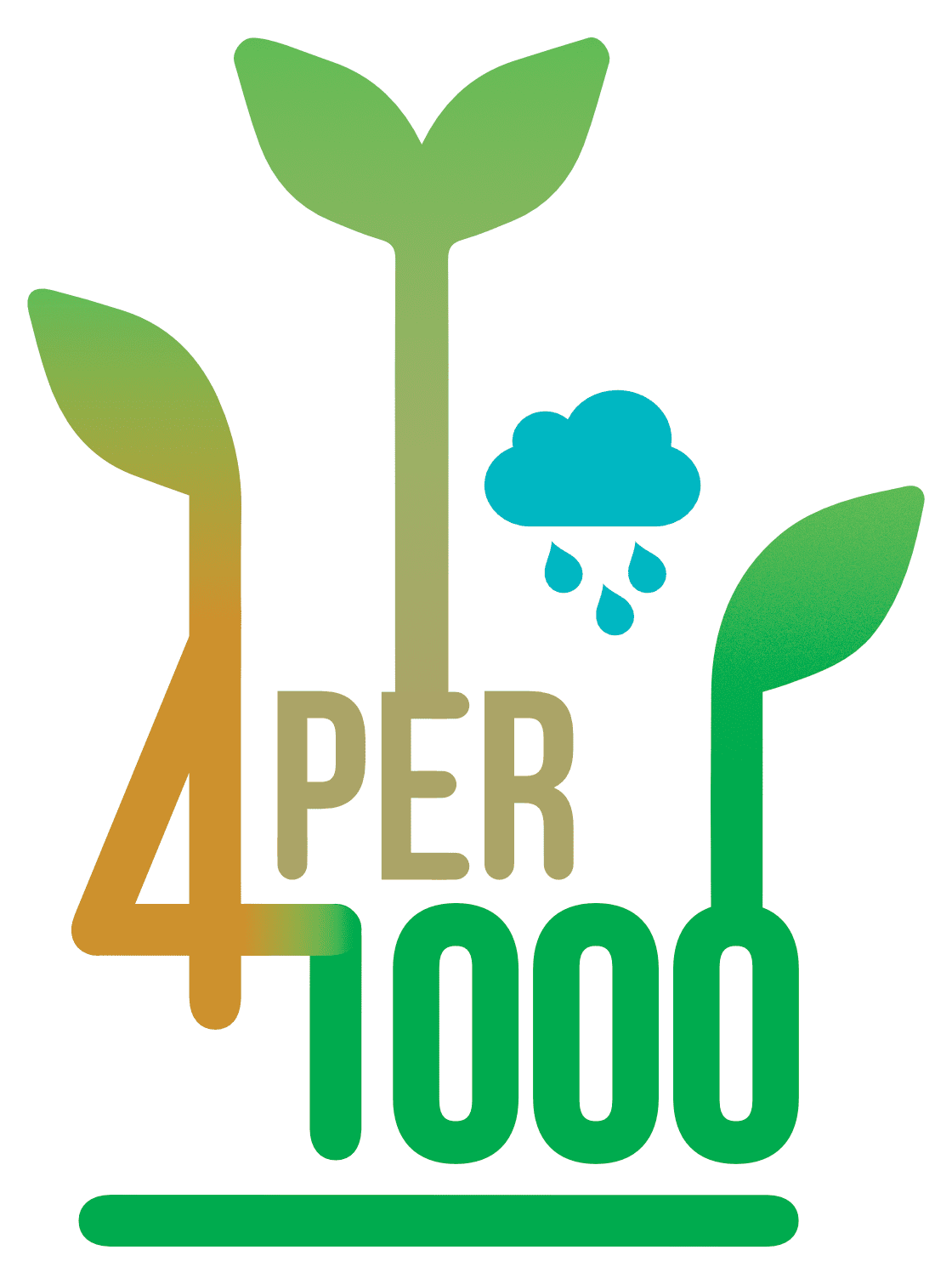Acting inwhat way?
You have the opportunity to take action in any of the Initiative’s strands, promoting actions for better soil carbon management to fight poverty and food insecurity, while contributing to climate change adaptation and mitigation, due to:
- Local management: the implementation at local level of agricultural and environmental management practices favourable to the restoration of soils, the increase of their organic carbon stock, the protection of carbon-rich soils and biodiversity;
- Training: setting up training and extension programmes to promote these practices; funding projects to restore, improve and/or preserve soil carbon stocks;
- Public policies: the development and implementation of public policies and appropriate tools;
- Supply chains: the development of soil-friendly agricultural supply chains…
- The International research and scientific cooperation programme: “Carbon in Soil: A Challenge for Food Security”, addressing four complementary scientific questions:
– study of the mechanisms and estimation of carbon storage potential in soils according to regions and systems
– evaluation of the performance of virtuous agricultural practices and their consequences on sequestration and on other production and regulation services
– supporting innovations and stimulating them through appropriate policies
– monitoring, reporting and verification (MRV), in particular for farmers.
Projects, concrete actions and results in this field, in particular research results, can be exchanged on the collaborative platform, allowing everyone to benefit from the experience of others.
Which "4 per 1000" College and Group could you join?
States, public authorities or communities, regional or International organisations, scientific or technical organisations, research and educational institutions, agricultural and forestry professional organisations, financial institutions, civil society organisations, foundations and companies, will be able to join the Partners Forum as soon as they express the wish to share the principles and objectives of the Initiative defined in the Joint Declaration of Intent.
The Forum of Partners of the international “4 per 1000” Initiative is made up of five colleges :
• States, local authorities and International and regional organisations, development banks
• Research and educational institutions
• Agricultural and forestry producer organisations
• Civil society organisations and non-profit foundations
• Commercial and for-profit organisations ;
and a “Funder” Group.
States and local Authorities

States and local Authorities commit themselves to:
- Support an International Soil Initiative with a triple “win-win-win” goal
- Support agriculture and forestry as sectors contributing to the fight against climate change
- Combat land degradation while having a positive impact on food security
- Recognize that soils are vital for life on Earth and that living soils preserve biodiversity.
- Storing carbon in soils means combating climate changes, increasing their fertility, their water retention capacity and thus potentially the yields, reducing their susceptibility to erosion. This enables rural families, farmers to better live from their work on the land, to make better use of them by remaining sedentary, and thus limiting migratory flows
- Entrench public policies to support carbon storage in soils over time, beyond the usual practice of a five-year plan, by using another time scale (half a century or a century for example)
- Work for the opening of carbon markets to new sectors such as agriculture and agroforestry
- Valorise the share of agriculture and forestry in the NDCs (Nationally Determined Contribution)
- Pursue the efforts undertaken for the recognition of the role of agriculture in the fight against climate change
- Enable consumers to invest in a process to combat climate change through a choice of products derived from agricultural production methods closer to nature
- Invest for the future by supporting some practices, projects, and policies that promote the carbon storage in soils with some multiple “win-win-win” goals
- Make known the practices, projects and policies for which the sponsor(s) is seeking some financing
- Choose to transmit and promote knowledge and practices in favour of agroecology.
As well as...
- Accompany the transition of agricultural systems through the establishment of a suitable regulatory environment
- Set up some training programs for farmers and advisors on agricultural development on improving soil organic matter levels
- Accompany the transition of agricultural systems through the establishment of a suitable regulatory environment
- Adopt some appropriate public policies, especially in land tenure such as the Voluntary Guidelines for a Tenure Governance (CSA 2012) and Sustainable Land Management
- Finance the implementation of development or research projects in line with the “4 per 1000” Initiative
- Develop some policies for the supply of agricultural products that encourage sustainable soil management through public procurement where appropriate
- Mobilise the stakeholders to encourage them to take actions in order to conserve soils for food security and climate
- Combat land degradation while having a positive impact on food security
- Entrench public policies to support carbon storage in soils over time, beyond the usual practice of a five-year plan, by using another time scale (half a century or a century for example)
- Help the agriculture and forestry sectors contribute to the fight against climate change
- Identify, adapt and facilitate the dissemination of good practices and ensure that they correspond to the expectations of producers in relation to research, development stakeholders and agricultural professional organizations
- Contribute and encourage the adoption of new practices to store more carbon while increasing soil fertility and resilience in relation to research, development and other stakeholders.
- Encourage the supply of products from practices beneficial to soil carbon as they do for deforestation
- Prohibit the supply chains of products derived from practices that induce soil degradation
InternationalOrganisations
International Organisations commit themselves to:
- Support an International Soil Initiative with a triple “win-win-win” goal
- Support agriculture and forestry as sectors contributing to the fight against climate change
- Combat land degradation while having a positive impact on food security
- Recognize that soils are vital for life on Earth and that living soils preserve biodiversity.
- Storing carbon in soils means combating climate changes, increasing their fertility, their water retention capacity and thus potentially the yields, reducing their susceptibility to erosion. This enables rural families, farmers to better live from their work on the land, to make better use of them by remaining sedentary, and thus limiting migratory flows
- Entrench public policies to support carbon storage in soils over time, beyond the usual practice of a five-year plan, by using another time scale (half a century or a century for example)
- Work for the opening of carbon markets to new sectors such as agriculture and agroforestry
- Valorise the share of agriculture and forestry in the NDCs (Nationally Determined Contribution)
- Pursue the efforts undertaken for the recognition of the role of agriculture in the fight against climate change
- Adopt some production modes closer to nature (agroecology) while improving the return on investment and reducing costs and increasing yields, therefore potentially profits
- Inspire and learn from traditional farming practices that give prominence to trees at the heart of agricultural production, as in agroforestry systems
- Meet the scientific challenge of a better knowledge of carbon storage in soils, storage with multiple beneficial effects, in order to better control the factors favourable to this storage and the balance between the nutrients
- Address the challenge of developing methods for measuring and assessing the quantity of carbon stored in soils at a lower cost
- Invest for the future by supporting some practices, projects, and policies that promote the carbon storage in soils with some multiple “win-win-win” goals
- Make known the practices, projects and policies for which the sponsor(s) is seeking some financing
- Choose to transmit and promote knowledge and practices in favour of agroecology.
As well as...
- Accompany the transition of agricultural systems through the establishment of a suitable regulatory environment
- Set up some training programs for farmers and advisors on agricultural development on improving soil organic matter levels
- Mobilise the stakeholders to encourage them to take actions in order to conserve soils for food security and climate
- Combat land degradation while having a positive impact on food security
Public and private donorsAll funding organizations

Public and private funders commit themselves to:
- Support an International Soil Initiative with a triple “win-win-win” goal
- Support agriculture and forestry as sectors contributing to the fight against climate change
- Combat land degradation while having a positive impact on food security
- Storing carbon in soils means combating climate changes, increasing their fertility, their water retention capacity and thus potentially the yields, reducing their susceptibility to erosion. This enables rural families, farmers to better live from their work on the land, to make better use of them by remaining sedentary, and thus limiting migratory flows
- Entrench public policies to support carbon storage in soils over time, beyond the usual practice of a five-year plan, by using another time scale (half a century or a century for example)
- Invest for the future by supporting some practices, projects, and policies that promote the carbon storage in soils with some multiple “win-win-win” goals
- Work for the opening of carbon markets to new sectors such as agriculture and agroforestry
- Identify some practices, projects and policies in search of finance under the framework of donor goals (development banks, foundations, etc.)
- Recognize that soils are vital for life on Earth and that living soils preserve biodiversity.
As well as...
- Mobilise the stakeholders to encourage them to take actions in order to conserve soils for food security and climate
- Set themselves an ambitious target for support for development projects that facilitate the dissemination and implementation of agricultural practices that lead to an increase and/or stabilization of levels of organic matter and to protect agricultural soils from degradation
- Finance training and awareness-raising projects, research and development projects or the establishment of soil carbon monitoring systems
- Support the development of tools that estimate the impact of agricultural development projects on soil carbon.
- Help the agriculture and forestry sectors contribute to the fight against climate change
- Support financially the rehabilitation or preservation projects of agricultural soils.
- Support some soil rehabilitation projects
Research andeducational institutions

Research and educational institutions commit themselves to:
- Support an International Soil Initiative with a triple “win-win-win” goal
- Propose some modes of production that emphasise the potential of plants as a mechanism for capturing and storing atmospheric carbon
- Combat land degradation while having a positive impact on food security
- Recognize that soils are vital for life on Earth and that living soils preserve biodiversity.
- Inspire and learn from traditional farming practices that give prominence to trees at the heart of agricultural production, as in agroforestry systems
- Meet the scientific challenge of a better knowledge of carbon storage in soils, storage with multiple beneficial effects, in order to better control the factors favourable to this storage and the balance between the nutrients
- Leverage scientific knowledge to develop some new production systems that are inspired by traditional practices to increase carbon storage in soils
- Address the challenge of developing methods for measuring and assessing the quantity of carbon stored in soils at a lower cost
- Choose to transmit and promote knowledge and practices in favour of agroecology.
- Pursue the efforts undertaken for the recognition of the role of agriculture in the fight against climate change
As well as...
- Finance the implementation of development or research projects in line with the “4 per 1000” Initiative
- Mobilise the stakeholders to encourage them to take actions in order to conserve soils for food security and climate
- Finance training and awareness-raising projects, research and development projects or the establishment of soil carbon monitoring systems
- Identify, adapt and facilitate the dissemination of good practices and ensure that they correspond to the expectations of producers in relation to research, development stakeholders and agricultural professional organizations
- Contribute and encourage the adoption of new practices to store more carbon while increasing soil fertility and resilience in relation to research, development and other stakeholders.
- Encourage the supply of products from practices beneficial to soil carbon as they do for deforestation
- Support some soil rehabilitation projects
Producer organisationsproducers organisations

Agricultural and forestry producers organisations commit themselves to:
- Support an International Soil Initiative with a triple “win-win-win” goal
- Support agriculture and forestry as sectors contributing to the fight against climate change
- Combat land degradation while having a positive impact on food security
- Storing carbon in soils means combating climate changes, increasing their fertility, their water retention capacity and thus potentially the yields, reducing their susceptibility to erosion. This enables rural families, farmers to better live from their work on the land, to make better use of them by remaining sedentary, and thus limiting migratory flows
- Propose some modes of production that emphasise the potential of plants as a mechanism for capturing and storing atmospheric carbon
- Enable consumers to invest in a process to combat climate change through a choice of products derived from agricultural production methods closer to nature
- Recognize that soils are vital for life on Earth and that living soils preserve biodiversity.
- Adopt some production modes closer to nature (agroecology) while improving the return on investment and reducing costs and increasing yields, therefore potentially profits
- Inspire and learn from traditional farming practices that give prominence to trees at the heart of agricultural production, as in agroforestry systems
- Leverage scientific knowledge to develop some new production systems that are inspired by traditional practices to increase carbon storage in soils
- Make known the practices, projects and policies for which the sponsor(s) is seeking some financing
- Find some causes, projects, farmers, foresters, communities to defend and support for their work and contribution to the collective effort
- Choose to transmit and promote knowledge and practices in favour of agroecology.
As well as...
- Accompany the transition of agricultural systems through the establishment of a suitable regulatory environment
- Set up some training programs for farmers and advisors on agricultural development on improving soil organic matter levels
- Accompany the transition of agricultural systems through the establishment of a suitable regulatory environment
- Adopt some appropriate public policies, especially in land tenure such as the Voluntary Guidelines for a Tenure Governance (CSA 2012) and Sustainable Land Management
- Develop some policies for the supply of agricultural products that encourage sustainable soil management through public procurement where appropriate
- Mobilise the stakeholders to encourage them to take actions in order to conserve soils for food security and climate
- Combat land degradation while having a positive impact on food security
- Entrench public policies to support carbon storage in soils over time, beyond the usual practice of a five-year plan, by using another time scale (half a century or a century for example)
- Help the agriculture and forestry sectors contribute to the fight against climate change
- Identify, adapt and facilitate the dissemination of good practices and ensure that they correspond to the expectations of producers in relation to research, development stakeholders and agricultural professional organizations
- Contribute and encourage the adoption of new practices to store more carbon while increasing soil fertility and resilience in relation to research, development and other stakeholders.
- Inspire and learn from traditional farming practices that give prominence to trees at the heart of agricultural production, as in agroforestry systems
Civil society organisationsand non-profit foundations

Civil society organisations and non-profit foundations commit themselves to:
- Support an International Soil Initiative with a triple “win-win-win” goal
- Support agriculture and forestry as sectors contributing to the fight against climate change
- Enable consumers to invest in a process to combat climate change through a choice of products derived from agricultural production methods closer to nature
- Recognize that soils are vital for life on Earth and that living soils preserve biodiversity.
- Storing carbon in soils means combating climate changes, increasing their fertility, their water retention capacity and thus potentially the yields, reducing their susceptibility to erosion. This enables rural families, farmers to better live from their work on the land, to make better use of them by remaining sedentary, and thus limiting migratory flows
- Invest for the future by supporting some practices, projects, and policies that promote the carbon storage in soils with some multiple “win-win-win” goals
- Pursue the efforts undertaken for the recognition of the role of agriculture in the fight against climate change
- Find some causes, projects, farmers, foresters, communities to defend and support for their work and contribution to the collective effort
- Work for the opening of carbon markets to new sectors such as agriculture and agroforestry
- Make known the practices, projects and policies for which the sponsor(s) is seeking some financing
As well as...
- Adopt some appropriate public policies, especially in land tenure such as the Voluntary Guidelines for a Tenure Governance (CSA 2012) and Sustainable Land Management
- Develop some policies for the supply of agricultural products that encourage sustainable soil management through public procurement where appropriate
- Mobilise the stakeholders to encourage them to take actions in order to conserve soils for food security and climate
- Set themselves an ambitious target for support for development projects that facilitate the dissemination and implementation of agricultural practices that lead to an increase and/or stabilization of levels of organic matter and to protect agricultural soils from degradation
- Support the development of tools that estimate the impact of agricultural development projects on soil carbon.
- Identify, adapt and facilitate the dissemination of good practices and ensure that they correspond to the expectations of producers in relation to research, development stakeholders and agricultural professional organizations
- Inspire and learn from traditional farming practices that give prominence to trees at the heart of agricultural production, as in agroforestry systems
Commercial and for-profit organisations

Commercial and for-profit organisation commit themselves to:
- Support an International Soil Initiative with a triple “win-win-win” goal
- Support agriculture and forestry as sectors contributing to the fight against climate change
- Propose some modes of production that emphasise the potential of plants as a mechanism for capturing and storing atmospheric carbon
- Combat land degradation while having a positive impact on food security
- Adopt some production modes closer to nature (agroecology) while improving the return on investment and reducing costs and increasing yields, therefore potentially profits
- Inspire and learn from traditional farming practices that give prominence to trees at the heart of agricultural production, as in agroforestry systems
- Leverage scientific knowledge to develop some new production systems that are inspired by traditional practices to increase carbon storage in soils
- Work for the opening of carbon markets to new sectors such as agriculture and agroforestry
- Make known the practices, projects and policies for which the sponsor(s) is seeking some financing
- Enable consumers to invest in a process to combat climate change through a choice of products derived from agricultural production methods closer to nature
- Recognize that soils are vital for life on Earth and that living soils preserve biodiversity.
- Storing carbon in soils means combating climate changes, increasing their fertility, their water retention capacity and thus potentially the yields, reducing their susceptibility to erosion. This enables rural families, farmers to better live from their work on the land, to make better use of them by remaining sedentary, and thus limiting migratory flows
- Address the challenge of developing methods for measuring and assessing the quantity of carbon stored in soils at a lower cost
- Invest for the future by supporting some practices, projects, and policies that promote the carbon storage in soils with some multiple “win-win-win” goals
- Pursue the efforts undertaken for the recognition of the role of agriculture in the fight against climate change
- Choose to transmit and promote knowledge and practices in favour of agroecology.
As well as...
- Develop some policies for the supply of agricultural products that encourage sustainable soil management through public procurement where appropriate
- Mobilise the stakeholders to encourage them to take actions in order to conserve soils for food security and climate
- Contribute and encourage the adoption of new practices to store more carbon while increasing soil fertility and resilience in relation to research, development and other stakeholders.
- Encourage the supply of products from practices beneficial to soil carbon as they do for deforestation
- Provide financial support for projects to rehabilitate or preserve agricultural soils
- Prohibit the supply chains of products derived from practices that induce soil degradation
- Support some soil rehabilitation projects
